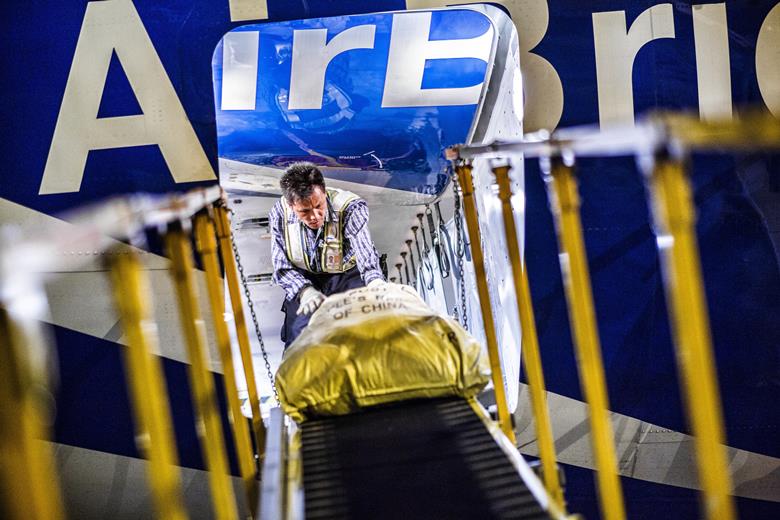Can airlines overcome supply-chain challenges to meet strong air cargo demand?
30 / 09 / 2021

Image source: AirBridgeCargo
By most accounts, the strong demand for air cargo seen during the Covid-19 pandemic is likely to continue into the peak freight season in the fourth quarter of this year.
“Air cargo demand had another strong month in August, up 7.7% compared to pre-Covid levels,” said IATA director general Willie Walsh in late September, as the association released its latest data for the sector. “Many of the economic indicators point to a strong year-end peak season.”
That outlook follows a buoyant 18 months, with the positive performance of air freight being in stark contrast to the desperate situation in passenger markets.
But the surge in demand for air cargo and attractive yields do not come without complications. Crucially, the sector is unavoidably part of the wider supply-chain issues that have been reported around the world in recent weeks.
”One of the main challenges to further economic growth is a severe global supply-chain congestion resulting from pandemic restrictions,” says IATA in its latest market-outlook commentary.
As airlines ready themselves for the peak season, they do so knowing that those supply-chain issues are likely to be a feature of the market for some time yet.
“Hopes for an end to disruption around Chinese New Year look unlikely to be realised,” wrote analysts at Bernstein in a late-September report. ”Supply chains have been under immense pressure, transportation demand is relentless, ports are unable to cope, and a bullwhip effect continues to reverberate globally.”
The “emerging view” is, therefore, that the market will normalise ”more likely in the second half of 2022”, according to Bernstein.
Amid that difficult operating environment, the International Air Cargo Association (TIACA) – which represents airlines, shippers, freight forwarders, ground handlers and airports – warned on 22 September that the sector faces “unprecedented challenges” and “supply chain disruptions” as it heads into the last months of the year.
“Air cargo has played a vital role these past 18 months and is facing a potentially record fourth quarter, but planning must start now,” says TIACA chairman Steven Polmans. “Resourcing and capacity will be issues, handling and facility space will be an issue, delivery and drivers will be an issue.
“We should be proud of the innovative, agile and flexible approaches adopted by the industry these past 18 months and now we must equally rise proactively to these new challenges as the weight of customer expectations mount.”
The pandemic has already put “relentless pressure” on air cargo providers, TIACA explains, as the industry worked to meet high demand for shipments of PPE, e-commerce products, vaccines, perishables and other critical cargo, “while economies and society went into lockdowns then reopened”.
Air cargo operators have met that demand while grappling with work and quarantine restrictions for crew, handling staff and other key workers. Crucial parts of the wider logistics chain have battled similar issues, further complicating the operating environment.
As the year-end approaches, even higher e-commerce demand, among other market drivers, is expected to put more stress on the system, particularly amid Covid-related worker restrictions in countries such as China, which TIACA says are “causing cargo to be disbursed across neighbouring countries and airports, causing further challenges”.
The air cargo association also notes that with passenger demand still depressed in many markets, the sector is unable to rely on the 45% of freight capacity that came from such services pre-Covid.
The most recent IATA data shows international belly capacity was down 38% in August 2021 compared with the same month in 2019.
“This will create further operational challenges, with freighter networks currently operating at unprecedented levels of efficiency, utilisation and optimisation,” TIACA states.
IATA also warns of pressures on capacity caused by “delays and flight cancellations in airports and uncertainty about schedules”. It notes that the cargo capacity recovery “paused in August”, having levelled off in July – a month which already saw an “exceptionally tight” capacity situation, in IATA’s view, with load factors at record levels.
Furthermore, “the combination of robust consumer demand and capacity pressures has been pushing up already elevated shipping rates”, IATA says, which ultimately makes air cargo too expensive for some businesses.
At the same time, TIACA notes that the maritime industry is facing its “own issues with ever growing port congestion, hinterland transfer delays, blank sailings and rising costs of shipping”. As a result, the cargo body says, “many shippers, faced with such challenges to traditional supply chains, are exploring air cargo to ensure customer demands can be met”, further stress-testing the airline system.
But if the air cargo sector can handle those challenges, the rewards might continue to be rich.
”One of the key indicators that continues to bode well for the near-term cargo demand is the low level of stock for businesses as shown by inventory-to-sales ratios,” says IATA. “Historically, this pattern has been associated with rising air cargo volumes since businesses and shippers tend to favour air cargo over the other modes of transport to meet the strong customer demand as quickly as possible.”
As a result, the airline association predicts that cargo demand “will remain strong” amid upcoming e-commerce events such as Black Friday and the Christmas holidays.
It cautions, however, that if the available capacity falls further, ”there might be some setbacks on the way for volumes actually carried”.














